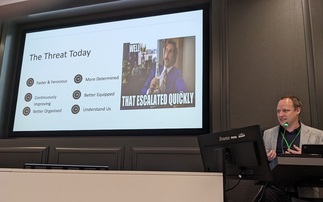Xiphos Research co-founder says some of the instances are 'shockingly bad' but that banks aren't interested in mitigating risks
More than half of the UK's retail banks have insecure instances of SSL, which are associated with supposedly "secure" login functions, making it easier for cyber criminals to get their hands on fin...
To continue reading this article...
Join Computing
- Unlimited access to real-time news, analysis and opinion from the technology industry
- Receive important and breaking news in our daily newsletter
- Be the first to hear about our events and awards programmes
- Join live member only interviews with IT leaders at the ‘IT Lounge’; your chance to ask your burning tech questions and have them answered
- Access to the Computing Delta hub providing market intelligence and research
- Receive our members-only newsletter with exclusive opinion pieces from senior IT Leaders






















